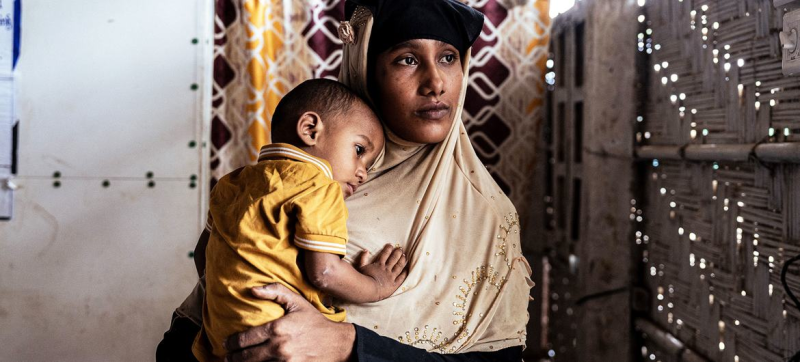- Inqilab Monch Seeks Home Adviser’s Exit |
- UN Calls for Calm in Bangladesh After Protest Leader’s Killing |
- DMP issues 7 traffic directives for Osman Hadi’s Janaza |
- Vested quarter fuelling chaos to impose new fascism: Fakhrul |
- Hadi’s namaz-e-janaza at 2:30pm Saturday |
UN Calls for Global Support for Rohingya on 8th Exodus Anniversary

A woman holds her one-year-old son during a visit to a UNICEF nutrition facility in a Rohingya refugee camp in Cox’s Bazar, Bangladesh.
Monday marks eight years since the mass displacement of the Rohingya from Rakhine State in Myanmar, and the United Nations is calling for greater international solidarity with the mainly Muslim minority community.
More than 700,000 fled to neighbouring Bangladesh after armed attacks by a militant group against Myanmar security forces sparked a brutal military crackdown that began on 25 August 2017. They joined thousands who had escaped earlier waves of violence and discrimination, now living in refugee camps across the border in Cox’s Bazar district.
In a statement marking the anniversary, UN Spokesman Stéphane Dujarric noted that the Rohingya, both in and outside Myanmar, are facing a further deterioration of their already dire circumstances.
“In Rakhine State, Rohingya and other civilians are caught in the crossfire between the Myanmar military and the Arakan Army and subjected to forced recruitment, human rights violations, and other abuses,” he said.
Ongoing violence has forced more Rohingya to flee, including to Bangladesh, which is already hosting over one million refugees from Myanmar. A military coup forced Myanmar’s democratically elected government from power in 2021, fuelling armed insurgencies throughout the country after a brutal military crackdown on protests.
Mr. Dujarric said reports of pushbacks, removals, and deportations across the region raise serious concerns over potential violations of the principle of non-refoulement and shrinking asylum space. Funding cuts are severely limiting education, food assistance, healthcare, livelihood opportunities, and protection services.
The Spokesman said UN Secretary-General António Guterres has reiterated his call for the protection of all civilians in accordance with international law. The Secretary-General also recalled his visit to Cox’s Bazar, Bangladesh, where he witnessed the resilience of Rohingya communities.
He stressed the urgent need for strengthened international solidarity and increased support, alongside efforts toward a comprehensive political solution that meaningfully includes the Rohingya and addresses their displacement and the root causes of the protracted crisis.
“The Secretary-General is hopeful that the 30 September High-Level Conference on Rohingya and other minorities in New York, as mandated by the United Nations General Assembly, will draw renewed international attention to the urgency of finding durable solutions,” said Mr. Dujarric.
He added that the Special Envoy of the Secretary-General on Myanmar continues to engage all stakeholders to end the brutal civil conflict and support a viable Myanmar-led political process. This should also lead to the voluntary, safe, dignified, and sustainable return of the Rohingya to Myanmar.

